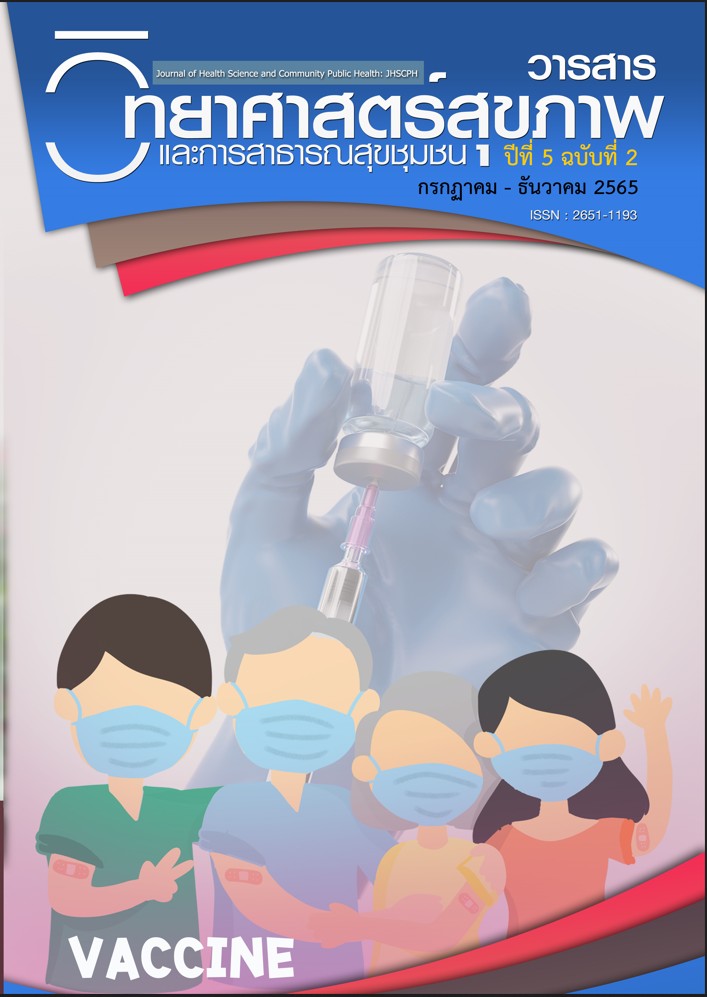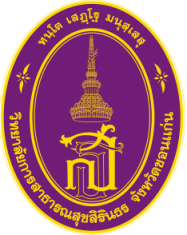พฤติกรรมการบริโภคอาหารเช้าและคุณภาพการเรียน ของนักศึกษาระดับอุดมศึกษา
คำสำคัญ:
การบริโภคอาหารเช้า, คุณภาพการเรียน, นักศึกษาบทคัดย่อ
การวิจัยเชิงพรรณนาแบบภาคตัดขวางครั้งนี้มีวัตถุประสงค์เพื่อศึกษาพฤติกรรมการบริโภคอาหารเช้าและหาความสัมพันธ์ระหว่างพฤติกรรมการบริโภคอาหารเช้ากับคุณภาพการเรียน
ของนักศึกษาวิทยาลัยการสาธารณสุขสิรินธร จังหวัดขอนแก่น กลุ่มตัวอย่างคือ นักศึกษาวิทยาลัย
การสาธารณสุขสิรินธร จังหวัดขอนแก่น ที่ศึกษาอยู่ชั้นปีที่ 1 ปีการศึกษา 2563 จำนวน 135 คน
เครื่องมือที่ใช้ในการเก็บรวบรวมข้อมูลคือ แบบสอบถามคุณภาพของการเรียนและพฤติกรรมการบริโภคอาหาร วิเคราะห์ข้อมูลโดยใช้สถิติเชิงพรรณนา ได้แก่ ร้อยละ ค่าเฉลี่ย ส่วนเบี่ยงเบนมาตรฐานและ
หาความสัมพันธ์ด้วยสถิติ Chi square
ผลการวิจัยพบว่า กลุ่มตัวอย่าง เคยงดรับประทานอาหารมื้อเช้าสัปดาห์ละ 1-2 ครั้ง ร้อยละ 67.41 สาเหตุหลักคือไม่มีเวลา ร้อยละ 52.59 มีการดื่มนมเป็นอาหารเช้า 1-2 ครั้งต่อสัปดาห์ ร้อยละ 48.89 ส่วนใหญ่ไม่ดื่ม ชา หรือกาแฟเป็นอาหารเช้า ร้อยละ 58.52 ชนิดของอาหารที่รับประทาน
เป็นอาหารเช้าเป็นประจำ 5-7 ครั้งต่อสัปดาห์ คือข้าว ร้อยละ 61.48 เนื้อสัตว์ ร้อยละ 47.41
ผัก ร้อยละ 31.85 และ ผลไม้ ร้อยละ 22.96 ระดับคุณภาพการเรียน อยู่ในระดับสูง (Mean =3.78, S.D.=0.81) ส่วนความสัมพันธ์ระหว่างพฤติกรรมการบริโภคอาหารเช้ากับคุณภาพการเรียน
ของนักศึกษา พบว่าพฤติกรรมการบริโภคอาหารเช้า ได้แก่ การวางแผนการรับประทานอาหาร
การระมัดระวังในการบริโภคอาหารแต่ละมื้อให้ถูกหลักโภชนาการ และการงดอาหารมื้อเช้าไม่มีความสัมพันธ์กับคุณภาพการเรียนของนักศึกษา (p-value>0.05)
จากผลการวิจัย สาเหตุหลักของการไม่รับประทานอาหารเช้าซึ่งเป็นมื้อสำคัญคือ ไม่มีเวลา
ไม่อยากอาหาร กลัวเข้าเรียนไม่ทัน ในเวลาเร่งด่วนตอนเช้า ดังนั้น สถาบันการศึกษาควรส่งเสริม
ให้นักศึกษารับประทานอาหารเช้า โดยสนับสนุนให้ร้านขายอาหารในสถาบันมีการขายอาหารเช้า
ที่เพียงพอและหลากหลายตรงกับตามความต้องการของนักศึกษา
This cross sectional descriptive study aimed to examine breakfast consumption and correlation between breakfast consumption and academic achievement among Sirindhorn College of Public Health Khon Kaen students. Participants were 135 year 1 students. Data were collected by questionnaires linked to academic achievement and breakfast consumption of students, and analyzed by descriptive statistics in terms of percentage, mean, standard deviation and also Chi square test.
The results revealed that the participants skipped breakfast once - twice a week (67.41%) because of shortage of time (52.59%) as a primary reason, and had milk for breakfast 1-2 times per week (48.89%). Most of participants did not have tea or coffee for breakfast (58.52%) and had types of breakfast, 5-7 times per week, as rice (61.48%), meat (47.41%), vegetables (31.85%) and fruits (22.96%). Regarding the academic achievement of the participants, it was at a high level (Mean=3.78, S.D.=0.81). The factors related to breakfast consumption of students in terms of food consumption plan, each meal of food consumption awareness and having no breakfast did not association with academic achievement of the students (p-value>0.05).
In conclusion, the main reasons for skipping breakfast of the students were shortage of time, lack of appetite and being late. It could be suggested that the college or institute should encourage the students to have breakfast ordinarily and encourage the college cafeteria to provide enough and varied breakfasts that meet the needs of students.
เอกสารอ้างอิง
Fitri A, Ludin M, Li LS, Mei H, Chiah T, Lin H, et al. Factors affecting breakfast consumption and its association with academic performance among undergraduates. J Intelek. 2016;10(2):1–6.
Alrayes A, Alowayshiq H, Altamimi H, Alangari R, Benajiba N. Association between Breakfast Intake and Short-Term Memory, Performance and Mood among Saudi Female Adolescents. North African J Food Nutr Res. 2018;2(4): 75–80.
Sofar SM, El Hafeez NAA. Relations between skipping breakfast, academic performance and body mass index among undergraduate university nursing students. J Nurs Heal Sci [Internet]. 2019;8(4): 32–42. Available from: www.iosrjournals.org
Arshad N, Ahmed U. Impact of Breakfast Habits on Education Performance of University Students (A Study Conducted on University of Sargodha, Pakistan). Int J Acad Res Progress Educ Dev. 2014 May 15;3(1).
ปิยะกุล สิทธิรัตน์ ณ นครพนม, อนุชาติ มาธนะสารวุฒิ. ความสัมพันธ์ระหว่างการบริโภคอาหารเช้า และความเหนื่อยล้าในนักศึกษาแพทย ์ คณะแพทยศาสตร ์ มหาวิทยาลัยเชียงใหม่. วารสารสาธารณสุขล้านนา. 2016;12(2):1–9.
สุวรรณรัตน์ สุบรรณ, แก้ววิไล สุจจชารี, สุภาพ วนารัตน์มงคล, วสุนธรา รตโรภาส. การประชุมวิชาการระดับชาติ มหาวิทยาลัยราชภัฏกำแพงเพชร ครั้งที่ 3. 2016;22 ธค 2559: ณ มหาวิทยาลัยราชภัฏกำแพงเพชร.
Unaal G, Uzdil Z, Kokdener M, Ozenoglu A. Breakfast habits and diet quality among university students and its effect on anthropometric measurements and academic success. Prog Nutr. 2017;19(2):154–62.
Mazurek-Kusiak AK, Kobyłka A, Korcz N, Sosnowska M. Analysis of eating habits and body composition of young adult poles. Nutrients. 2021;13(11):1–19.
Abro S, Saleem Q, Lashari J, Khalid G, Khan M, Malik F. Breakfast practices and factors associated with skipping of breakfast in medical students. J Rawalpindi Med Coll. 2021;25(1): 37–41.
Phillips GW. Does Eating Breakfast Affect the Performance of College Students on Biology Exams? Bioscene. 2005;30(4): 15-19.
Peña-jorquera H, Campos-n V, Sadarangani KP, Ferrari G, Jorquera-aguilera C, Cristi-montero C. Breakfast: A Crucial Meal for Adolescents’ Cognitive Performance According to Their Nutritional Status. The Cogni-Action Project. Nutrients. 2021;13(4):1320.
Chawla R, Emy MK, Harpreet M, Jasvinder K, Wafi A. Role of breakfast , BMI And English language proficiency on academic performance of undergraduate dental students : A cross- sectional study. Br J Med Heal Sci. 2019;1(3):56–68.
Chaimongkol L, Daree N, Kabae I. Breakfast Skipping in School Children: A Case Study of Schools in Municipality and Non-municipality Area of Muang, Pattani Province. J Nutr Assoc Thail. 2021;56(2).
ดาวน์โหลด
เผยแพร่แล้ว
รูปแบบการอ้างอิง
ฉบับ
ประเภทบทความ
สัญญาอนุญาต
ลิขสิทธิ์ (c) 2022 วารสารวิทยาศาสตร์สุขภาพและการสาธารณสุขชุมชน

อนุญาตภายใต้เงื่อนไข Creative Commons Attribution-NonCommercial-NoDerivatives 4.0 International License.
บทความที่ได้รับการตีพิมพ์เป็นลิขสิทธิ์ของวารสารวิทยาศาสตร์สุขภาพและการสาธารณสุขชุมชน (Journal of Health Science and Community Public Health) ข้อความที่ปรากฏในบทความแต่ละเรื่องในวารสารวิชาการเล่มนี้เป็นความคิดเห็นส่วนตัวของผู้เขียนแต่ละท่านไม่เกี่ยวข้องกับวิทยาลัยการ สาธารณสุขสิรินธรจังหวัดขอนแก่น และคณาจารย์ท่านอื่นๆในวิทยาลัยฯ แต่อย่างใด ความรับผิดชอบองค์ประกอบทั้งหมดของบทความแต่ละเรื่องเป็นของผู้เขียนแต่ละท่าน หากมีความผิดพลาดใดๆ ผู้เขียนแต่ละท่านจะรับผิดชอบบทความของตนเองแต่ผู้เดียว






